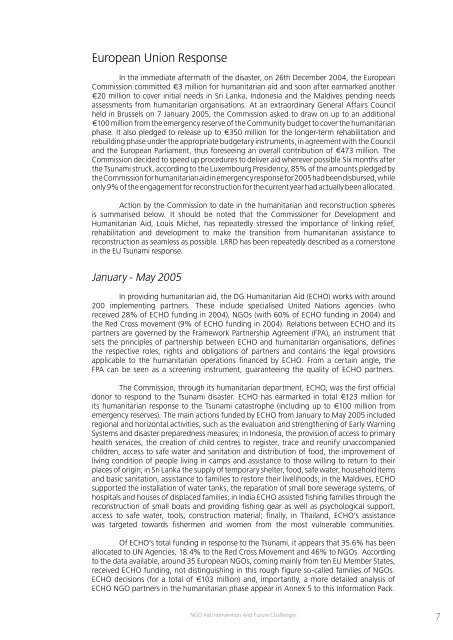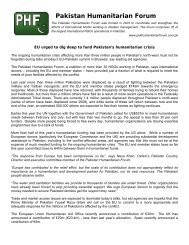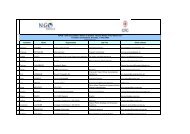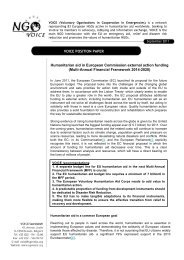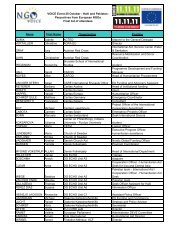Tsunami one year after, NGO aid intervention and future ... - VOICE
Tsunami one year after, NGO aid intervention and future ... - VOICE
Tsunami one year after, NGO aid intervention and future ... - VOICE
Create successful ePaper yourself
Turn your PDF publications into a flip-book with our unique Google optimized e-Paper software.
European Union Response<br />
In the immediate <strong>after</strong>math of the disaster, on 26th December 2004, the European<br />
Commission committed €3 million for humanitarian <strong>aid</strong> <strong>and</strong> soon <strong>after</strong> earmarked another<br />
€20 million to cover initial needs in Sri Lanka, Ind<strong>one</strong>sia <strong>and</strong> the Maldives pending needs<br />
assessments from humanitarian organisations. At an extraordinary General Affairs Council<br />
held in Brussels on 7 January 2005, the Commission asked to draw on up to an additional<br />
€100 million from the emergency reserve of the Community budget to cover the humanitarian<br />
phase. It also pledged to release up to €350 million for the longer-term rehabilitation <strong>and</strong><br />
rebuilding phase under the appropriate budgetary instruments, in agreement with the Council<br />
<strong>and</strong> the European Parliament, thus foreseeing an overall contribution of €473 million. The<br />
Commission decided to speed up procedures to deliver <strong>aid</strong> wherever possible.Six months <strong>after</strong><br />
the <strong>Tsunami</strong> struck, according to the Luxembourg Presidency, 85% of the amounts pledged by<br />
the Commission for humanitarian <strong>aid</strong> in emergency response for 2005 had been disbursed, while<br />
only 9% of the engagement for reconstruction for the current <strong>year</strong> had actually been allocated.<br />
Action by the Commission to date in the humanitarian <strong>and</strong> reconstruction spheres<br />
is summarised below. It should be noted that the Commissi<strong>one</strong>r for Development <strong>and</strong><br />
Humanitarian Aid, Louis Michel, has repeatedly stressed the importance of linking relief,<br />
rehabilitation <strong>and</strong> development to make the transition from humanitarian assistance to<br />
reconstruction as seamless as possible. LRRD has been repeatedly described as a cornerst<strong>one</strong><br />
in the EU <strong>Tsunami</strong> response.<br />
January - May 2005<br />
In providing humanitarian <strong>aid</strong>, the DG Humanitarian Aid (ECHO) works with around<br />
200 implementing partners. These include specialised United Nations agencies (who<br />
received 28% of ECHO funding in 2004), <strong>NGO</strong>s (with 60% of ECHO funding in 2004) <strong>and</strong><br />
the Red Cross movement (9% of ECHO funding in 2004). Relations between ECHO <strong>and</strong> its<br />
partners are governed by the Framework Partnership Agreement (FPA), an instrument that<br />
sets the principles of partnership between ECHO <strong>and</strong> humanitarian organisations, defines<br />
the respective roles, rights <strong>and</strong> obligations of partners <strong>and</strong> contains the legal provisions<br />
applicable to the humanitarian operations financed by ECHO. From a certain angle, the<br />
FPA can be seen as a screening instrument, guaranteeing the quality of ECHO partners.<br />
The Commission, through its humanitarian department, ECHO, was the first official<br />
donor to respond to the <strong>Tsunami</strong> disaster. ECHO has earmarked in total €123 million for<br />
its humanitarian response to the <strong>Tsunami</strong> catastrophe (including up to €100 million from<br />
emergency reserves). The main actions funded by ECHO from January to May 2005 included<br />
regional <strong>and</strong> horizontal activities, such as the evaluation <strong>and</strong> strengthening of Early Warning<br />
Systems <strong>and</strong> disaster preparedness measures; in Ind<strong>one</strong>sia, the provision of access to primary<br />
health services, the creation of child centres to register, trace <strong>and</strong> reunify unaccompanied<br />
children, access to safe water <strong>and</strong> sanitation <strong>and</strong> distribution of food, the improvement of<br />
living condition of people living in camps <strong>and</strong> assistance to those willing to return to their<br />
places of origin; in Sri Lanka the supply of temporary shelter, food, safe water, household items<br />
<strong>and</strong> basic sanitation, assistance to families to restore their livelihoods; in the Maldives, ECHO<br />
supported the installation of water tanks, the reparation of small bore sewerage systems, of<br />
hospitals <strong>and</strong> houses of displaced families; in India ECHO assisted fishing families through the<br />
reconstruction of small boats <strong>and</strong> providing fishing gear as well as psychological support,<br />
access to safe water, tools, construction material; finally, in Thail<strong>and</strong>, ECHO’s assistance<br />
was targeted towards fishermen <strong>and</strong> women from the most vulnerable communities.<br />
Of ECHO’s total funding in response to the <strong>Tsunami</strong>, it appears that 35.6% has been<br />
allocated to UN Agencies, 18.4% to the Red Cross Movement <strong>and</strong> 46% to <strong>NGO</strong>s. According<br />
to the data available, around 35 European <strong>NGO</strong>s, coming mainly from ten EU Member States,<br />
received ECHO funding, not distinguishing in this rough figure so-called families of <strong>NGO</strong>s.<br />
ECHO decisions (for a total of €103 million) <strong>and</strong>, importantly, a more detailed analysis of<br />
ECHO <strong>NGO</strong> partners in the humanitarian phase appear in Annex 5 to this Information Pack.<br />
<strong>NGO</strong> Aid Intervention And Future Challenges<br />
7


